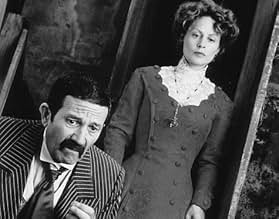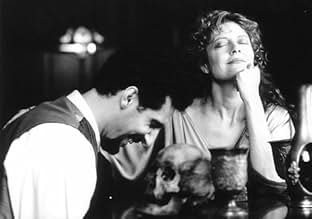Illuminata
- 1998
- Tous publics
- 1h 59m
IMDb RATING
6.0/10
1.8K
YOUR RATING
A turn-of-the-20th-century theatre repertory company rejects the latest project of their beloved playwright Tuccio, kicking off a saga of intrigue surrounding the influential critic Bevalaqu... Read allA turn-of-the-20th-century theatre repertory company rejects the latest project of their beloved playwright Tuccio, kicking off a saga of intrigue surrounding the influential critic Bevalaqua and star Celimene.A turn-of-the-20th-century theatre repertory company rejects the latest project of their beloved playwright Tuccio, kicking off a saga of intrigue surrounding the influential critic Bevalaqua and star Celimene.
- Awards
- 1 nomination total
Henri Béhar
- Pitou
- (as Henri Behar)
Timothy Doyle
- Aristocrat #1
- (as Timothy Doyle)
Featured reviews
Superficially about love (isn't everything?) this effort really concerns itself with a recurring question in theater: how important are the actors?
In recent years, there have been a dozen or so movies by actors that deal with this and insist they are paramount. The most entertaining (in a camp way) is "Wag the Dog," perhaps the most intelligent "Vanya on 42nd St" and the most interesting Branagh's "Midwinter's Night." The most financially successful is "Shakespeare in Love."
This is not a sex farce, nor about love. That's all just grist for motion. Here we have a message from the "puppets," underscored by pleasant framing of the film by puppets. What the writers of this work have done is suggest that the life of any play comes from the lives of the actors. This is in contrast to plays written by genius playwrights like Ibsen, that are merely "performed." For this troupe to have to participate in such an enterprise is seen as hell.
Thus we have their (thinly distilled) lives appear on the stage. Along the way we have an audience that is purely incidental since they don't know what's good anyway. We have the theater owner who likewise is ignorant, but married to a failed thespian who suspects. We have the all-important critic whose real interesting characteristic is not his flamboyant gayness, but his views on art: he values writing, values the fulfillment of the author's intent. So he is particularly vulnerable to being abused. The character is a parody of Wilde who came down strongly on this controversy.
We have the vain celebrity (Sarandon) who does not have the commitment to the art of acting. She briefly tempts our author who really in his heart loves and respects the actors, here represented by the head of the troupe. Sarandon has a speech where she claims she loves the art, but it is clear she loves herself only. Is she a parody on Ellen Terry? Walkin and Sarandon clearly as actors believe in the supremacy of the actor, so in playing the "bad guys" they overly ham it up so that we know where they really stand. In so doing, they undercut their purported honor somewhat. Rather unsettling, especially so since they are amusing at it.
And we also have the troupe itself. They do double duty here: first showing honest commitment. Second providing the material that appears in the play, each representing a distinct stereotype. Wheels turn, people love and not, die and not. This strange crew (and any like it) we are told is worth it despite the strangeness. Along the way many writers are quoted from the Greeks through Chekhov. This is not new stuff, as noted above, but once you know what it is about it is well enough done. However, there is only so much reward one can get, the work can only go but so deep when it is turned over to actors. See where I stand?
If you come looking for a sex farce where the theater is incidental, your mistake will lead you to disappointment as it clearly did many who commented before me.
In recent years, there have been a dozen or so movies by actors that deal with this and insist they are paramount. The most entertaining (in a camp way) is "Wag the Dog," perhaps the most intelligent "Vanya on 42nd St" and the most interesting Branagh's "Midwinter's Night." The most financially successful is "Shakespeare in Love."
This is not a sex farce, nor about love. That's all just grist for motion. Here we have a message from the "puppets," underscored by pleasant framing of the film by puppets. What the writers of this work have done is suggest that the life of any play comes from the lives of the actors. This is in contrast to plays written by genius playwrights like Ibsen, that are merely "performed." For this troupe to have to participate in such an enterprise is seen as hell.
Thus we have their (thinly distilled) lives appear on the stage. Along the way we have an audience that is purely incidental since they don't know what's good anyway. We have the theater owner who likewise is ignorant, but married to a failed thespian who suspects. We have the all-important critic whose real interesting characteristic is not his flamboyant gayness, but his views on art: he values writing, values the fulfillment of the author's intent. So he is particularly vulnerable to being abused. The character is a parody of Wilde who came down strongly on this controversy.
We have the vain celebrity (Sarandon) who does not have the commitment to the art of acting. She briefly tempts our author who really in his heart loves and respects the actors, here represented by the head of the troupe. Sarandon has a speech where she claims she loves the art, but it is clear she loves herself only. Is she a parody on Ellen Terry? Walkin and Sarandon clearly as actors believe in the supremacy of the actor, so in playing the "bad guys" they overly ham it up so that we know where they really stand. In so doing, they undercut their purported honor somewhat. Rather unsettling, especially so since they are amusing at it.
And we also have the troupe itself. They do double duty here: first showing honest commitment. Second providing the material that appears in the play, each representing a distinct stereotype. Wheels turn, people love and not, die and not. This strange crew (and any like it) we are told is worth it despite the strangeness. Along the way many writers are quoted from the Greeks through Chekhov. This is not new stuff, as noted above, but once you know what it is about it is well enough done. However, there is only so much reward one can get, the work can only go but so deep when it is turned over to actors. See where I stand?
If you come looking for a sex farce where the theater is incidental, your mistake will lead you to disappointment as it clearly did many who commented before me.
Susan Sarandon! Her work as Celimene is a comic sight to behold. Whenever she's onscreen (which isn't enough) the material's full comedic potential kicks into overdrive. "Illuminata" the movie, leaves a lot to be desired--namely more Susan Sarandon at her most breathtakingly beautiful. At an age when most women give up any hope of ever being thought of as sexually appealing or sexually viable, to be exact, Susan owns her many charms and certainly knows how to make the most of them. Her seduction of Tuccio (played by John Turturro) is one of the most erotic in recent cinematic history. And, that it contains one of the funniest "gradification sequences" ever captured on celluloid just goes to show that no matter what age she may happen to be, the one and only Susan Sarandon is and always will be one of the sexiest women alive and the definitive "thinking man's sex symbol" as well as a truly gifted actress quite adept at comedy. By the way, what you just read was written by a 22 year old man--when it comes to beauty, both inside and out, age is nothing but a number. A virtue that Ms. Sarandon continues to redefine with each passing year. I know a magnificient talent when I see it. Score: The film gets 6 out of 10/B-, Susan Sarandon gets a 10/A+ as always.
Wonderful characters, glib and meaningful dialogue, a portrait of theater and its denizens so complete you believe the film is a biography.
There are no small actors here because there are no small parts. What might have been a cameo becomes a pivotal role.
It has been said that the film was missing direction. Not at all. What was happening there was style. This guys loves women and shape and color, and what he likes best is wit.
The entire cast....and that is everybody, was wonderful, so good you could smell the sweat. Camera and sets were so good you could hear floor boards creak. Music, well and tastefully done.
Recommendation: see it once for the discovery, twice for the appreciation, three times for the education. You will not be bored.
There are no small actors here because there are no small parts. What might have been a cameo becomes a pivotal role.
It has been said that the film was missing direction. Not at all. What was happening there was style. This guys loves women and shape and color, and what he likes best is wit.
The entire cast....and that is everybody, was wonderful, so good you could smell the sweat. Camera and sets were so good you could hear floor boards creak. Music, well and tastefully done.
Recommendation: see it once for the discovery, twice for the appreciation, three times for the education. You will not be bored.
I don't know how this ended up with such a middling rating. It stands out as one of the wittiest, strangest and well-constructed films I've seen in years. Well photographed, with many characters wonderfully and unexpectedly acted. Appropriate for almost any mood, occasion or atmosphere.
This film shines from the loving direction that Tuturro lavishes upon Brandon Cole's screenplay. The entire cast is delightful, with Katherine Borowitz's loving and tormented Rachel and Christopher Walken's sexually aggressive Bevalaqua truly standing out. It was great to see a film about the theatre done so passionately, after the dull and trite "Shakespeare in Love".
I was mesmerized by the performances. Tuturro, Borowitz and Sewell moved so seamlessly in and out of characters that you often felt that you were in "Illuminata".
This film reminded me with an equally remarkable film, Louis Malle's "Vanya on 42nd Street". I'm going to have fire up the laser disc player on that one tonight.
If you are a fan of the theatre or works on the theatre, then "Illuminata" is certainly going to work its magic on you.
I was mesmerized by the performances. Tuturro, Borowitz and Sewell moved so seamlessly in and out of characters that you often felt that you were in "Illuminata".
This film reminded me with an equally remarkable film, Louis Malle's "Vanya on 42nd Street". I'm going to have fire up the laser disc player on that one tonight.
If you are a fan of the theatre or works on the theatre, then "Illuminata" is certainly going to work its magic on you.
Did you know
- TriviaCinematographer Harris Savides (1957-2012) has an uncredited part as a theatre patron who walks up to John Turturro's character Tuccio, the resident playwright of the theatre, and says to him: "Did you see the play? I hated it.".
- ConnectionsReferenced in Moesha: Mis-directed Study (1999)
- How long is Illuminata?Powered by Alexa
Details
Box office
- Gross US & Canada
- $840,134
- Opening weekend US & Canada
- $53,264
- Aug 8, 1999
- Gross worldwide
- $866,865
- Runtime
- 1h 59m(119 min)
- Sound mix
- Aspect ratio
- 1.85 : 1
Contribute to this page
Suggest an edit or add missing content






























